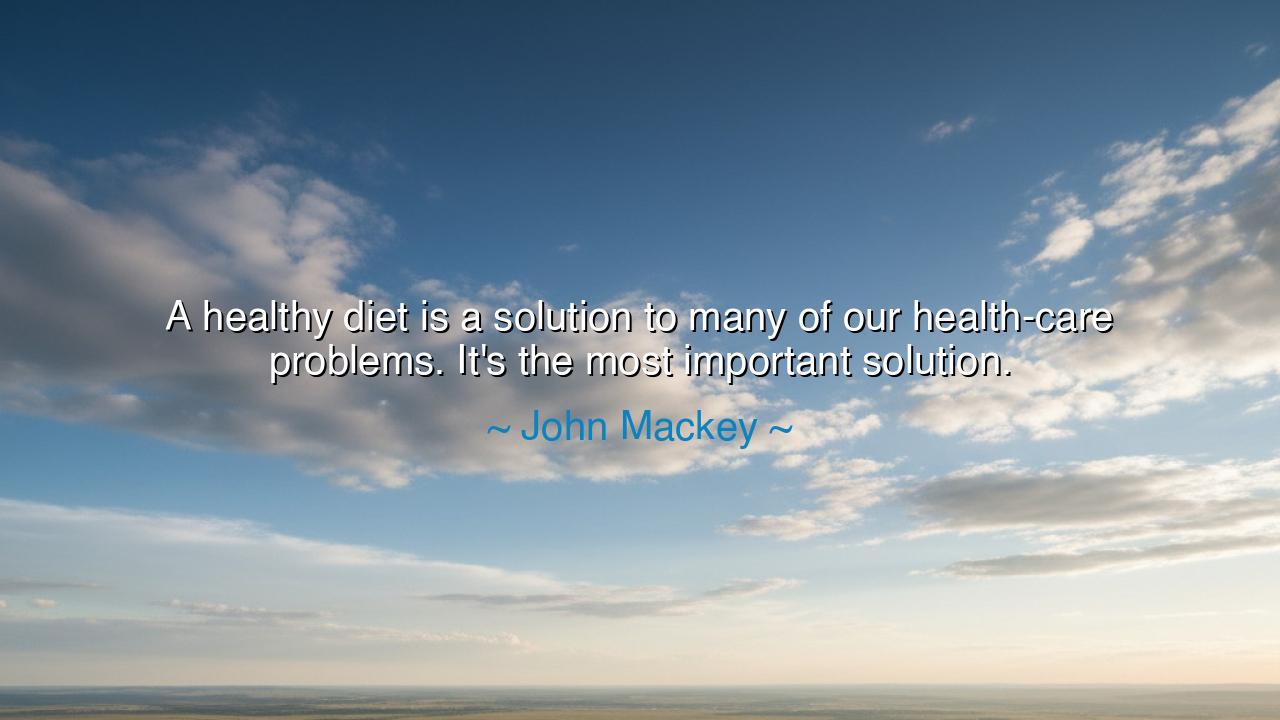
A healthy diet is a solution to many of our health-care problems.
A healthy diet is a solution to many of our health-care problems. It's the most important solution.






"A healthy diet is a solution to many of our health-care problems. It's the most important solution." These words, spoken by John Mackey, resonate with a deep and ancient truth that has been passed down through generations: the foundation of health lies not in fleeting remedies or quick fixes, but in the way we choose to nourish our bodies. In a world often consumed by medical treatments and technological advancements, Mackey reminds us that the most powerful tool for achieving well-being is something far simpler—our diet. The food we choose to consume has the profound ability to heal, strengthen, and protect us. It is the first step, the foundation of a long, healthy life, and it is one that we must approach with wisdom and intention.
In the ancient world, philosophers and healers understood that food was not merely fuel for the body, but a reflection of the balance between the body, the mind, and the spirit. Hippocrates, the father of medicine, famously said, "Let food be thy medicine, and let medicine be thy food." This timeless wisdom echoes through Mackey’s statement—food is not simply a source of calories, but a vital force that can prevent and heal illness. The Greeks, particularly, believed that true health and vitality were maintained through balanced nourishment, emphasizing the importance of eating foods that restore harmony within the body. In the same way, Mackey’s emphasis on diet as a solution to health-care problems calls us back to the roots of wellness, where nourishing the body with simple, wholesome foods is the most powerful preventative measure.
The ancient Romans were no strangers to the idea that diet was integral to strength and health. Roman soldiers, the backbone of the empire, were given simple, nutrient-dense meals to maintain their endurance, strength, and vitality during long marches and battles. Cicero, the Roman philosopher, believed that the discipline required to maintain a balanced and healthy diet was just as important as physical training in building resilience. His writings reflect an understanding that the health of the body and the clarity of the mind depend on what one consumes. Similarly, Mackey’s statement reflects this idea—that what we put into our bodies is the foundation of our ability to achieve and maintain health, energy, and vitality.
Consider the story of Pythagoras, the Greek philosopher, who was a strict advocate of vegetarianism. Pythagoras believed that eating a plant-based diet not only cleansed the body but elevated the mind and spirit. He practiced what he preached, living a life that connected the purity of the body to the pursuit of wisdom. To Pythagoras, diet was a form of discipline, a way of aligning the body with the natural rhythms of the universe. His philosophy was clear: a body free from toxins and excess allowed for a clearer mind and a healthier spirit. In the same way, Mackey’s vision of a healthy diet as a solution to health-care problems urges us to consider that true healing and health are rooted not in temporary fixes, but in a long-term commitment to nourishing our bodies with the foods that align with our highest potential.
In the Eastern tradition, particularly within Ayurveda, the ancient system of medicine from India, there is a deep understanding that food plays a vital role in physical and spiritual health. Ayurvedic teachings hold that the right foods can balance the doshas (the energies that govern our bodies), promote longevity, and prevent illness. This view holds that food is not merely sustenance, but a form of medicine, a direct connection to our well-being. In this context, Mackey’s assertion that a healthy diet is the most important solution reflects ancient knowledge that still holds true today. Our choices—what we eat, how we nourish ourselves—have the power to either maintain or disrupt the harmony between our bodies, minds, and spirits.
The lesson in Mackey’s words is simple yet profound: the path to lasting health begins with food. It is not in the magic pill, the quick fix, or the temporary diet trends, but in the daily choices we make about what we eat. A healthy diet is the foundation of well-being, and it has the power to prevent disease, enhance mental clarity, and improve overall quality of life. This truth is as old as the first healers who understood the deep connection between nourishment and health. It is a message that calls us to embrace moderation, balance, and simplicity in our diets, just as the ancients did.
In practical terms, we must embrace the wisdom of healthy eating as the cornerstone of our lives. This does not mean following extreme or restrictive diets, but rather choosing whole, natural foods that nourish us—vegetables, whole grains, and lean proteins. It is about cultivating a life of awareness—mindfully choosing foods that sustain our bodies, strengthen our minds, and nurture our spirits. By adopting this approach, we can begin to address the many health-care problems that plague us today, and create a foundation for a long, vibrant life.
Thus, let us take John Mackey’s words and the ancient wisdom of diet to heart. Let us consider our food not just as a source of sustenance, but as the key to health, vitality, and well-being. Let us honor our bodies by choosing the foods that will allow us to thrive—foods that are simple, natural, and full of life. Through these choices, we can begin to build a life grounded in the ancient wisdom of balance, and approach our modern health-care problems not with reliance on temporary solutions, but with a commitment to long-term wellness.






AAdministratorAdministrator
Welcome, honored guests. Please leave a comment, we will respond soon